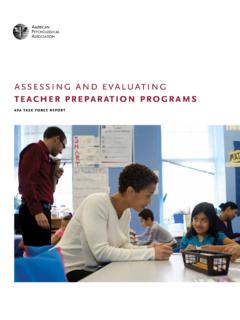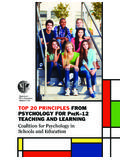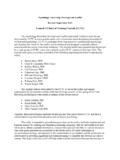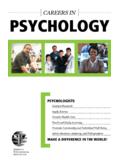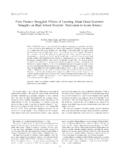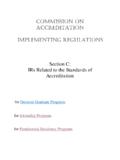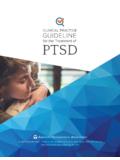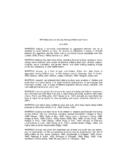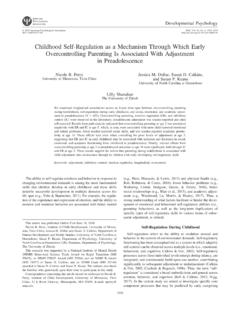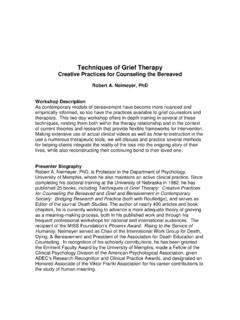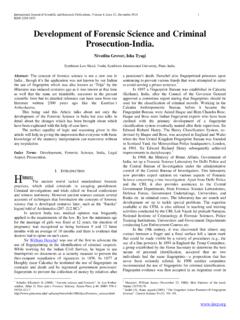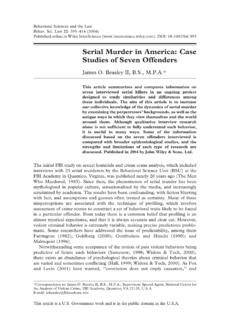Transcription of Specialty Guidelines for Forensic Psychology
1 Specialty Guidelines for Forensic Psychology American Psychological Association In the past 50 years Forensic psychological practice has educational systems including, but not limited to, examin- expanded dramatically. The American Psychological As- ing or treating persons in anticipation of or subsequent to sociation (APA) has a division devoted to matters of law legal, contractual, or administrative proceedings; offering and Psychology (APA Division 41, the American Psy- expert opinion about psychological issues in the form of chology Law Society), a number of scientific journals de- amicus briefs or testimony to judicial, legislative, or ad- voted to interactions between Psychology and the law exist ministrative bodies; acting in an adjudicative capacity.
2 ( , Law and Human Behavior; Psychology , Public Pol- serving as a trial consultant or otherwise offering expertise icy, and Law; Behavioral Sciences & the Law), and a to attorneys, the courts, or others; conducting research in number of key texts have been published and undergone connection with, or in the anticipation of, litigation; or multiple revisions ( , Grisso, 1986, 2003; Melton, Pe- involvement in educational activities of a Forensic nature. trila, Poythress, & Slobogin, 1987, 1997, 2007; Rogers, Psychological practice is not considered Forensic 1988, 1997, 2008). In addition, training in Forensic psy- solely because the conduct takes place in, or the product is chology is available in predoctoral, internship, and post- presented in, a tribunal or other judicial, legislative, or doctoral settings, and APA recognized Forensic Psychology administrative forum.
3 For example, when a party (such as as a Specialty in 2001, with subsequent recertification in a civilly or criminally detained individual) or another in- 2008. dividual (such as a child whose parents are involved in Because the practice of Forensic Psychology differs in divorce proceedings) is ordered into treatment with a prac- important ways from more traditional practice areas (Mo- titioner, that treatment is not necessarily the practice of nahan, 1980) the Specialty Guidelines for Forensic Psy- Forensic Psychology . In addition, psychological testimony chologists were developed and published in 1991 (Com- that is solely based on the provision of psychotherapy and mittee on Ethical Guidelines for Forensic Psychologists, does not include psycholegal opinions is not ordinarily 1991).
4 Because of continued developments in the field in considered Forensic practice. the ensuing 20 years, Forensic practitioners' ongoing need For the purposes of these Guidelines , Forensic practi- for guidance, and policy requirements of APA, the 1991 tioner refers to a psychologist when engaged in the practice Specialty Guidelines for Forensic Psychologists were of Forensic Psychology as described above. Such profes- revised, with the intent of benefiting Forensic practitioners sional conduct is considered Forensic from the time the and recipients of their services alike. practitioner reasonably expects to, agrees to, or is legally The goals of these Specialty Guidelines for Forensic mandated to provide expertise on an explicitly psycholegal Psychology ( the Guidelines ) are to improve the quality of issue.
5 Forensic psychological services; enhance the practice and The provision of Forensic services may include a wide facilitate the systematic development of Forensic psychol- variety of psycholegal roles and functions. For example, as ogy; encourage a high level of quality in professional practice; and encourage Forensic practitioners to acknowl- edge and respect the rights of those they serve. These This article was published Online First October 1, 2012. Guidelines are intended for use by psychologists when These Specialty Guidelines for Forensic Psychology were developed by the American Psychology Law Society (Division 41 of the American engaged in the practice of Forensic Psychology as described Psychological Association [APA]) and the American Academy of Foren- below and may also provide guidance on professional sic Psychology .
6 They were adopted by the APA Council of Representa- conduct to the legal system and other organizations and tives on August 3, 2011. professions. The previous version of the Guidelines ( Specialty Guidelines for Forensic Psychologists ; Committee on Ethical Guidelines for Forensic For the purposes of these Guidelines , Forensic psy- Psychologists, 1991) was approved by the American Psychology Law chology refers to professional practice by any psychologist Society (Division 41 of APA) and the American Academy of Forensic working within any subdiscipline of Psychology ( , clin- Psychology in 1991. The current revision, now called the Specialty ical, developmental, social, cognitive) when applying the Guidelines for Forensic Psychology (referred to as the Guidelines .)
7 Throughout this document), replaces the 1991 Specialty Guidelines for scientific, technical, or specialized knowledge of psychol- Forensic Psychologists.. ogy to the law to assist in addressing legal, contractual, and These Guidelines are scheduled to expire August 3, 2021. After this administrative matters. Application of the Guidelines does date, users are encouraged to contact the American Psychological Asso- not depend on the practitioner's typical areas of practice or ciation Practice Directorate to confirm that this document remains in effect. expertise, but rather, on the service provided in the case at Correspondence concerning these Guidelines should be addressed to hand.
8 These Guidelines apply in all matters in which psy- the Practice Directorate, American Psychological Association, 750 First chologists provide expertise to judicial, administrative, and Street, NE, Washington, DC 20002-4242. January 2013 American Psychologist 7. 2012 American Psychological Association 0003-066X/12/$ Vol. 68, No. 1, 7 19 DOI: researchers, Forensic practitioners may participate in the The Guidelines are not intended to serve as a basis for collection and dissemination of data that are relevant to disciplinary action or civil or criminal liability. The stan- various legal issues. As advisors, Forensic practitioners may dard of care is established by a competent authority, not by provide an attorney with an informed understanding of the the Guidelines .
9 No ethical, licensure, or other administra- role that Psychology can play in the case at hand. As tive action or remedy, nor any other cause of action, should consultants, Forensic practitioners may explain the practical be taken solely on the basis of a Forensic practitioner acting implications of relevant research, examination findings, in a manner consistent or inconsistent with these Guide- and the opinions of other psycholegal experts. As examin- lines. ers, Forensic practitioners may assess an individual's func- In cases in which a competent authority references the tioning and report findings and opinions to the attorney, a Guidelines when formulating standards, the authority legal tribunal, an employer, an insurer, or others (APA, should consider that the Guidelines attempt to identify a 2010b, 2011a).
10 As treatment providers, Forensic practitio- high level of quality in Forensic practice. Competent prac- ners may provide therapeutic services tailored to the issues tice is defined as the conduct of a reasonably prudent and context of a legal proceeding. As mediators or nego- Forensic practitioner engaged in similar activities in similar tiators, Forensic practitioners may serve in a third-party circumstances. Professional conduct evolves and may be neutral role and assist parties in resolving disputes. As viewed along a continuum of adequacy, and minimally arbiters, special masters, or case managers with decision- competent and best possible are usually different points making authority, Forensic practitioners may serve parties, along that continuum.
